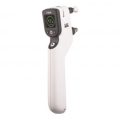-
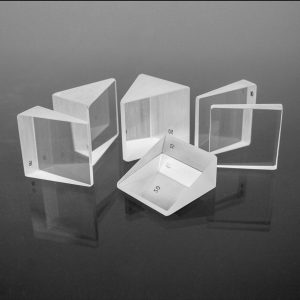 37mm square plastic prisms in your choice of diopter. Sold Individually. Item #: ASP+
37mm square plastic prisms in your choice of diopter. Sold Individually. Item #: ASP+ -
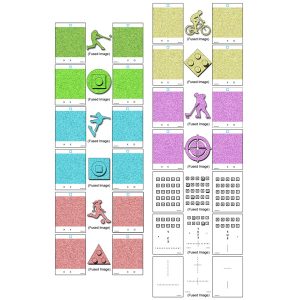 Random Dot card set for the Bernell-O-Phore. Set of 26 (13 pairs) full color cards. Each pair contains either a unique sport figure, shape pattern or numbered sequence. Images appear when fused. These fusion cards work with the BC300. Item #: BC300ES1
Random Dot card set for the Bernell-O-Phore. Set of 26 (13 pairs) full color cards. Each pair contains either a unique sport figure, shape pattern or numbered sequence. Images appear when fused. These fusion cards work with the BC300. Item #: BC300ES1 -
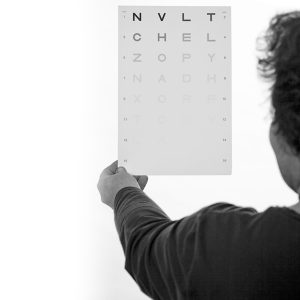
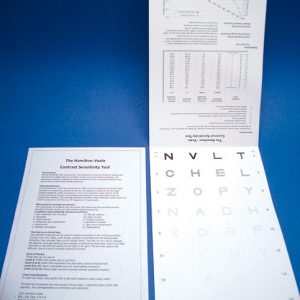 Hamilton-Veale Contrast Sensitivity Test This easy and convenient test can be used to monitor a decrease on the contrast sensitivity function over time. This test also demonstrates the difficulty of seeing in poor lighting or at night.
Hamilton-Veale Contrast Sensitivity Test This easy and convenient test can be used to monitor a decrease on the contrast sensitivity function over time. This test also demonstrates the difficulty of seeing in poor lighting or at night. -
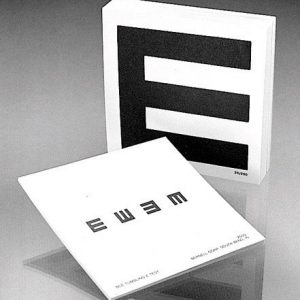 Tumbling E Pad (Pad of 100) Printed with large 20/200 E on one side and a series of five 20/20 tumbling Es on the other- calibrated to a 20ft. distance. May be used to test and train peripheral awareness.
Tumbling E Pad (Pad of 100) Printed with large 20/200 E on one side and a series of five 20/20 tumbling Es on the other- calibrated to a 20ft. distance. May be used to test and train peripheral awareness. -
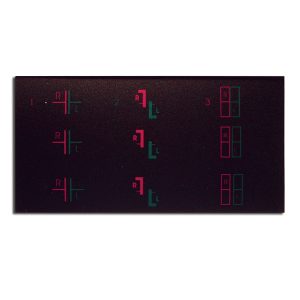
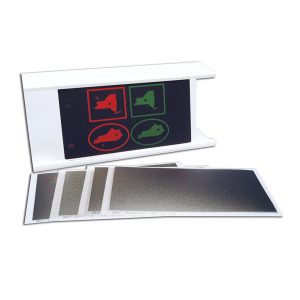 These offer excellent cancellation with no ghost images. These fixed demand targets provide flat fusion from 1-3 prism diopters, 2nd & 3rd degree fusion from 4-28 PD. BI & BO therapy is possible using a R/G flipper or switching the lenses in the goggles. (Set of 5 cards and one R/G Flipper)
These offer excellent cancellation with no ghost images. These fixed demand targets provide flat fusion from 1-3 prism diopters, 2nd & 3rd degree fusion from 4-28 PD. BI & BO therapy is possible using a R/G flipper or switching the lenses in the goggles. (Set of 5 cards and one R/G Flipper) -
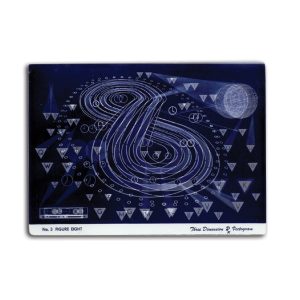 7-1/2" x 5-1/2" Non-Variable Polarized vectograms ensure testing and training at actuall distances. vectograms stabalize fusion and steropsis, eliminates suppression and develop simulatneous vision. Used in monocular, binocular pursuit and saccadic training, vectograms help correct and prevent anomalies involving projection and hand eye coordination. Ideal for use with Bernell's Dual Polachrome™ Trainer
7-1/2" x 5-1/2" Non-Variable Polarized vectograms ensure testing and training at actuall distances. vectograms stabalize fusion and steropsis, eliminates suppression and develop simulatneous vision. Used in monocular, binocular pursuit and saccadic training, vectograms help correct and prevent anomalies involving projection and hand eye coordination. Ideal for use with Bernell's Dual Polachrome™ Trainer -
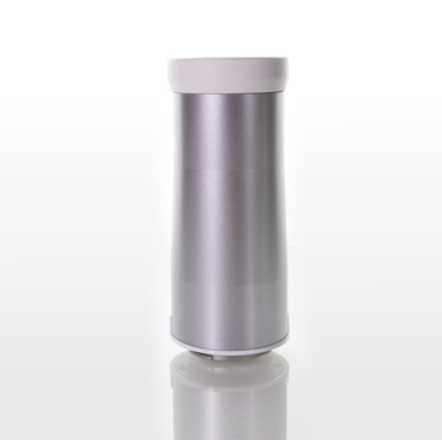
-
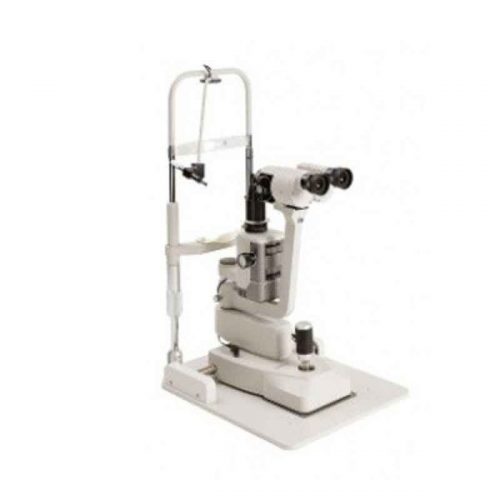
LED Slit Lamp RS Series
Slit lamp RS series have high quality optics with versatile functionalities and are easy to use. The series consists of three models: RS-5000, RS-500 and RS-300. RS-5000 is the high illumination tower model, while RS-500 is the low illumination compact model with 5 step magnifications. RS-300 is the primary model with three step magnifications yet with similar level of high performance and features. The optics of RS-5000/RS-500/RS-300 are bright and wide with an optimum convergence angle*(12 degrees). Drastic improvements were applied to the device in order to achieve comfortable and smooth operation by newly designed joystick and ergonomic base design that ensures solid movement to the various desired positions. The newly designed main and background illumination control dials are designed to be easily and intuitively used with one hand. From the wide range of LEDs, we have chosen the LED which is closest to the conventional halogen light colour temperature. *convergence angle is for RS-5000/500 only -
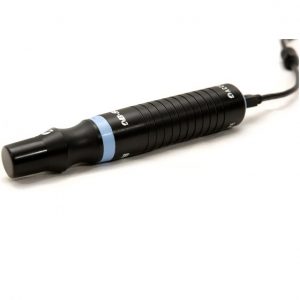
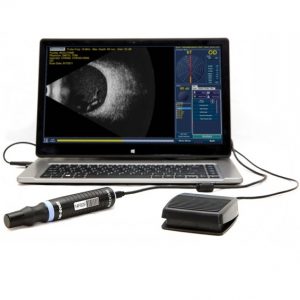 The B-Scan Plus’ and B-Scan Plus Vet's proprietary software combined with unique probe electronics make it the only portable High Definition B-Scan. While developing the B-Scan Plus software, Accutome visited many of the top facilities around the world. The results are a reliable and easy-to-use unit, which can quickly scan patients and transport information. Features:
The B-Scan Plus’ and B-Scan Plus Vet's proprietary software combined with unique probe electronics make it the only portable High Definition B-Scan. While developing the B-Scan Plus software, Accutome visited many of the top facilities around the world. The results are a reliable and easy-to-use unit, which can quickly scan patients and transport information. Features:- 0.015 mm resolution is among the highest in the medical industry.
- State-of-the-art probe design is sharper, more focused images due to the elimination of signal loss.
- Contains 4 useful measuring tools along with corresponding A-Vectoring for diagnosing ocular pathologies.
- The only unit with 2x full image zoom without distortion of real-time or captured scan.
- Portable probe can plug into any laptop or PC.*
- Unlimited 34 second film loops.
- Share Information Easily with adaptable document transfer via EMR, email or printer.
- Compact file storage is unsurpassed by the competition.
- Protect your investment with easily upgradeable software.
- User-friendly interface makes user manuals and quick start guides unnecessary.
- The B-Scan Plus sofware is now DICOM compatable.
-
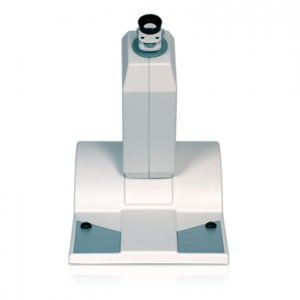
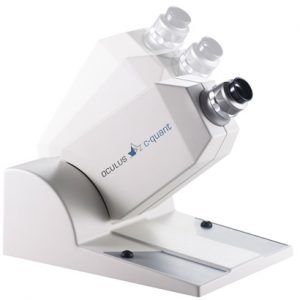 With this product development, OCULUS is once again living up to its motto, "We focus on progress”. The OCULUS C-Quant makes it possible to measure the amount of straylight in a human eye individually and reliably. The effect of increased straylight in the human eye can be compared to looking through a dirty windshield.
With this product development, OCULUS is once again living up to its motto, "We focus on progress”. The OCULUS C-Quant makes it possible to measure the amount of straylight in a human eye individually and reliably. The effect of increased straylight in the human eye can be compared to looking through a dirty windshield. -
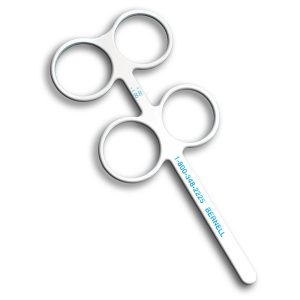 Test and train for accommodative facility, accommodative rock, positive/negative relative accommodation and convergence and fusional convergence reserves. May delay bifocal use with some early presbyopes. Assists in hyperopia screening and lens demonstrations. Durable, white plastic holds shape under low heat for lens insertion. Powers listed on handle. One pair plus; one pair minus. Select from +/- 0.25 to 4.00 diopters in 0.25 increments. Item #: BC1270+
Test and train for accommodative facility, accommodative rock, positive/negative relative accommodation and convergence and fusional convergence reserves. May delay bifocal use with some early presbyopes. Assists in hyperopia screening and lens demonstrations. Durable, white plastic holds shape under low heat for lens insertion. Powers listed on handle. One pair plus; one pair minus. Select from +/- 0.25 to 4.00 diopters in 0.25 increments. Item #: BC1270+ -
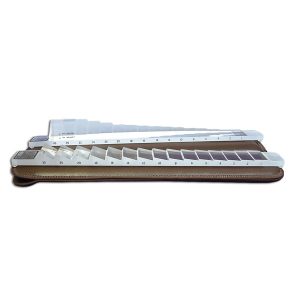 Set Includes Vertical prism bar with the following powers: 0.5, 1, 1.5, 2, 2.5 & 3 Horizontal prism bar with the following powers: 1, 3, 5, 10, 15 & 20 Item #: ACPS12
Set Includes Vertical prism bar with the following powers: 0.5, 1, 1.5, 2, 2.5 & 3 Horizontal prism bar with the following powers: 1, 3, 5, 10, 15 & 20 Item #: ACPS12


